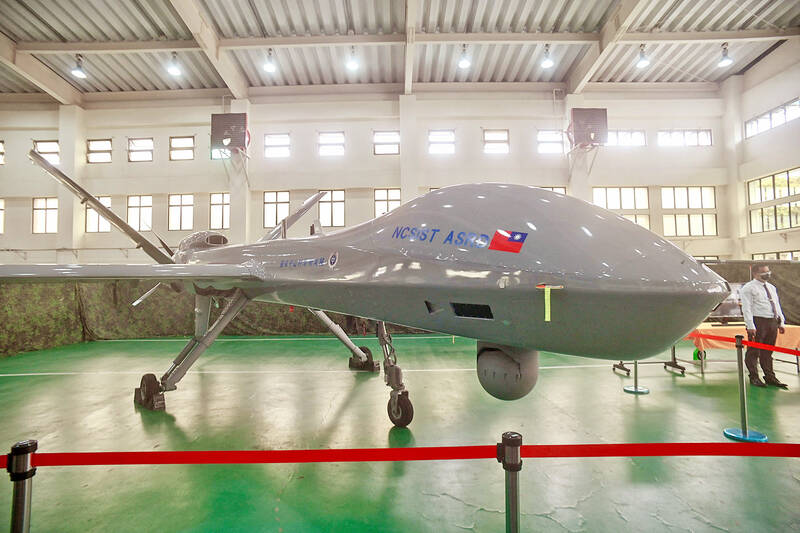Taipei and Washington are pushing for their drone companies to work together to establish a China-free supply chain, the Financial Times reported on Friday.
A delegation of high-level executives and US government officials were yesterday to arrive in Taipei to discuss with their Taiwanese counterparts collaboration on drone technology procurement and development, the report said.
The executives represent 26 US manufacturers of drone and counter-drone systems, while the officials are from the US Department of Commerce and the US Department of Defense’s Defense Innovation Unit, along with Dev Shenoy, principal director for microelectronics in the Office of the Under Secretary of Defense for Research and Engineering, it said.

Photo: Sam Yeh, AFP
China’s dominance in the global drone industry has raised security concerns in the past few years, it said.
The collaboration between Taiwan and the US is part of a broader trend of de-risking supply chains by moving manufacturing away from China, and also highlights Taiwan’s critical role in global supply chains, the Financial Times said.
A key focus of the US delegation is to seek suppliers and manufacturing partners outside of China, it said.
The delegation is “an opportunity for us to become part of their supply chain” and coproduce products, the report quoted Minister of National Defense Wellington Koo (顧立雄) as saying.
“As the US is putting such emphasis on removing China from supply chains and because drones can be dual-use products, a lot of other players will have to integrate their supply chains,” he said.
Other members of the delegation include executives from Dedrone, which supplies counter-drone systems, and defense contractor Northrop Grumman Corp, which has announced plans to expand into the Taiwanese market, the report said.
Taiwan is home to many commercial drone firms, but they are much smaller in scale than their Chinese competitors, and they also focus on smaller machines, it said.
After Russia’s invasion of Ukraine in 2022, Taiwan has sought to build a national “drone team” to support the industry, it said.
Unlike previous partnerships that involved the Ministry of National Defense’s research arm, Chungshan Institute of Science and Technology, the ministry last month announced contracts for military-grade commercial drones totaling NT$6.8 billion (US$US212.75 million).
Taiwan UAV (智飛科技), the nation’s oldest private drone manufacturer, won a contract for more than NT$2.4 billion to supply land-based surveillance drones.
In other developments, the ministry yesterday confirmed that a recent promotional video featured footage of a first-person view (FPV) drone system being developed by the Armaments Bureau.
On Aug. 15, the Military News Agency released footage of soldiers using laptops and remote control equipment to launch small, explosive-laden drones, which detonated upon striking a car and speedboat being used as targets.
FPV drones are piloted from the drone’s point of view through an onboard camera, footage from which is transmitted to a pilot’s monitor or video goggles.
The ministry confirmed in a post on social media that the video showed a multifunction FPV drone system being developed by the bureau.
In addition to the FPV drone program, the military also plans to purchase 3,422 domestically produced microdrones in six different models from this year to 2028, as well as two types of counter-drone systems with 976 missiles between this year and 2026, it said.
Additional reporting by CNA

The Central Election Commission has amended election and recall regulations to require elected office candidates to provide proof that they have no Chinese citizenship, a Cabinet report said. The commission on Oct. 29 last year revised the Measures for the Permission of Family-based Residence, Long-term Residence and Settlement of People from the Mainland Area in the Taiwan Area (大陸地區人民在台灣地區依親居留長期居留或定居許可辦法), the Executive Yuan said in a report it submitted to the legislature for review. The revision requires Chinese citizens applying for permanent residency to submit notarial documents showing that they have lost their Chinese household record and have renounced — or have never

A magnitude 5.6 earthquake struck off the coast of Yilan County at 12:37pm today, with clear shaking felt across much of northern Taiwan. There were no immediate reports of damage. The epicenter of the quake was 16.9km east-southeast of Yilan County Hall offshore at a depth of 66.8km, Central Weather Administration (CWA) data showed. The maximum intensity registered at a 4 in Yilan County’s Nanao Township (南澳) on Taiwan’s seven-tier scale. Other parts of Yilan, as well as certain areas of Hualien County, Taipei, New Taipei City, Taoyuan, Hsinchu County, Taichung and Miaoli County, recorded intensities of 3. Residents of Yilan County and Taipei received

Taiwan has secured another breakthrough in fruit exports, with jujubes, dragon fruit and lychees approved for shipment to the EU, the Ministry of Agriculture said yesterday. The Animal and Plant Health Inspection Agency on Thursday received formal notification of the approval from the EU, the ministry said, adding that the decision was expected to expand Taiwanese fruit producers’ access to high-end European markets. Taiwan exported 126 tonnes of lychees last year, valued at US$1.48 million, with Japan accounting for 102 tonnes. Other export destinations included New Zealand, Hong Kong, the US and Australia, ministry data showed. Jujube exports totaled 103 tonnes, valued at

BIG SPENDERS: Foreign investors bought the most Taiwan equities since 2005, signaling confidence that an AI boom would continue to benefit chipmakers Taiwan Semiconductor Manufacturing Co’s (TSMC, 台積電) market capitalization swelled to US$2 trillion for the first time following a 4.25 percent rally in its American depositary receipts (ADR) overnight, putting the world’s biggest contract chipmaker sixth on the list of the world’s biggest companies by market capitalization, just behind Amazon.com Inc. The site CompaniesMarketcap.com ranked TSMC ahead of Saudi Aramco and Meta Platforms Inc. The Taiwanese company’s ADRs on Tuesday surged to US$385.75 on the New York Stock Exchange, as strong demand for artificial intelligence (AI) applications led to chip supply constraints and boost revenue growth to record-breaking levels. Each TSMC ADR represents